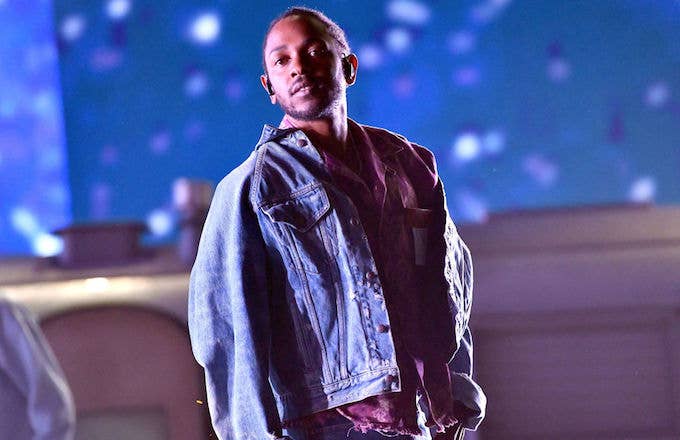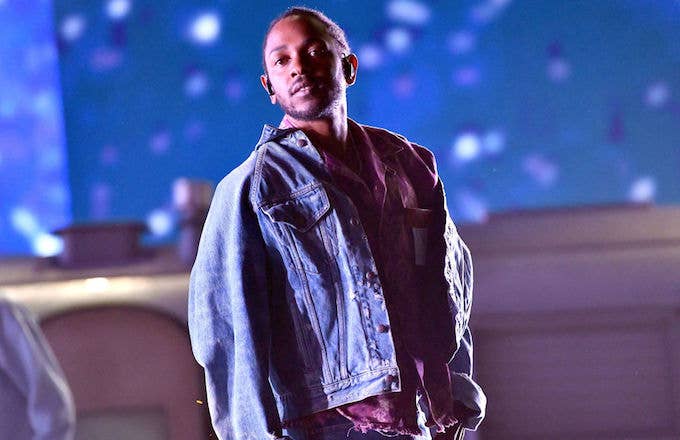
Last August, DRAMbrought XXXTentacion out during the L.A. stop of Kendrick Lamar’s Damn Tour. X’s novelty—a don’t-give-a-fuck attitude coupled with a jarring breakthrough single, “Look At Me!”—was fresh, and his appearance immediately sent the crowd into an uproar. The event was splashed across social media, with many thinking the tour pop-up equaled a cosign from K. Dot himself. Two weeks later, that cosign officially came when Kendrick tweeted a link to XXXTentacion's 17 album, praising it as "raw thoughts."
https://t.co/ovjuQN8weO listen to this album if you feel anything. raw thoughts. https://t.co/ovjuQN8weO
Since then, Kendrick has yet to comment on or even acknowledge the sordid allegations against X, charges which include aggravated battery of a pregnant woman, domestic battery by strangulation, false imprisonment, and witness-tampering, plus additional charges of harassing and tampering with a witness or victim.
It's been almost a year since Kendrick went out of his way to promote X. So when Bloomberg reported last week that Lamar’s representatives threatened to pull his music from Spotify over its polarizing “hateful conduct” policy, which affected artists like XXXTentacion, a red flag started to wave in my periphery. But let me not get ahead of myself.
In XXXTentacion’s case, his Spotify streams saw a 17 percent drop after being pulled from playlists like the incredibly popular Rap Caviar. Though he didn’t mention Spotify by name, TDE co-president Punch tweeted the following the same day as Spotify’s announcement: “Whoa. Are they censoring the music? That’s dangerous.”
Whoa. Are they censoring the music? That’s dangerous.
“Dangerous” is a peculiar word to use—XXXTentacion is quite literally dangerous. (Allegedly.) So we have a business decision being described in a way that mirrors the behavior that apparently influenced Spotify’s decision. “Censoring” is another strange choice. Spotify did not remove X’s music from its service—they were only going to keep it off of company-curated playlists. I’ll be the first to point out a slippery slope when I see one; hell, I wrote about the streaming giant’s new policy two weeks ago and called it just that. But in avoiding one slippery slope, we’re sliding down another.
Nobody—except the criminal justice system, and even that’s a stretch—can reform the behavior of X or his fellow Spotify target R. Kelly. The only people capable of doing that are the individuals themselves—and that seems unlikely, as they’ve both proclaimed their innocence. In the meantime, the rest of us have to figure out how to deal with legitimately dangerous people creating the soundtracks to our days, our summers, and our lives. Music is one of the most powerful media known to man. But too often, when man becomes artist, he takes advantage of that power and uses it as a shield against criticisms and allegations.
When you remove the veil of celebrity, it becomes more difficult to explain away support of those accused of abusive behavior. When it's one of us doing the accusing or abusing, we expect justice or at least accountability. Even as Hollywood reckons with harassment and assault accusations on a daily basis, institutions firing performers like Kevin Spacey or executives like Harvey Weinstein have not faced Spotify-style criticism. A post-#MeToo world is uncharted territory for all of us, but something has to be done.
Yes, Spotify taking a step toward “censoring” music is cause for alarm, mostly because there’s no tried and true way to reprimand every suspect artist fairly. But let’s at least acknowledge the danger that triggered this decision in the first place, and not (unlike, say, X’s representatives) use the excuse of imperfection as a reason to do nothing.
By Punch's standards, Kendrick's threat to pull his music can be called dangerous, too. Combined with other artist complaints, plus those of fans and activists, Kendrick’s stance will likely lead to X’s music being reinstated on Spotify’s promoted playlists. This opens the door to a whole new swarm of queries. Chiefly: How is anyone ever going to be held accountable for their actions if the world's biggest, most famous artists protect them? And what does it say about artists who choose to be uninformed about the misdeeds of their peers?
As a woman, the situation makes me side-eye Kendrick, even through all of his accomplishments, awards, and achievements. He’s obviously going to be remembered as an incredibly influential artist above all else, as well he should. But what kind of human being does he ultimately want to be remembered as? If his current stance towards X is any indication, it’s possible history may remember him as a great rapper, but a supporter of an abuser.

